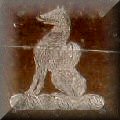|
|
John "Jack" Blennerhassett
Hassett & Harper Ltd, Silversmiths, Birmingham
"craftsmen in Silver and Metals" |
|
|
|
John "Jack" Blennerhassett, alias "J. B. Hassett" (b.1889 Birmingham, d.1969)
of Erdington & Wylde Green, Birmingham, and Churston Ferrers, Brixham, Devon.
Jack Blennerhassett before 1910 founded silversmiths Hassett & Harper, "craftsmen in silver and metals", located at Regent Place, Birmingham in Birmingham's famous Jewellery Quarter (see Museum of the Jewellery Quarter). Their silversmith's mark was H&H Ld (see "Silversmiths of Birmingham and their Marks, 1750-1980" by Kenneth Crisp-Jones, published 1981 by NAG Press Ltd, London).
Hassett & Harper also made pewter-ware, following their acquisition of "Sturges, Bladen & Middleton" who used the Knighthood trademark from the 1930s until they ceased trading in 1978, and "Browetts Pewterware Ltd" who used the Lion brand. For all business purposes Jack used the name "J. B. Hassett". The company appears to have ceased operating as Hassett & Harper c1968/9.
Jack was president of "The Birmingham Jewellers' Association" (later named "The British Jewellers' Association") when in 1938, at their annual dinner, the guest of honour and speaker was Prime Minister Neville Chamberlain. This event occurred immediately following Chamberlain's return from meeting Adolf Hitler at Munich, Chamberlain's speech following the dinner being the first broadcast about that event. The Chamberlains were a noted Birmingham family, his father, distinguished politician and statesman Joseph Chamberlain, having established himself as a Birmingham manufacturer in the mid 19th century. |
|
|
|
|
|
|
|
|
|
|
|
Silver ladies' powder-puff by Hassett & Harper ca1929-30 |
|
|
|
|
|
|
|
|
|
|
During World War II Hassett & Harper had contracts from the Admiralty, the Ministry of Aircraft Production (MAP) and the Ministry of Supply. They manufactured light steel pressings for ammunition and other items. They were one of several British companies participating in a secret program of war work, producing devices containing hidden objects intended to be used by downed aircrew or by British prisoners-of-war attempting to escape.
Typically the objects produced by these companies were innocent personal domestic items (hairbrushes, combs, razors, shaving brushes, tooth brushes) inside which were hidden maps, foreign currency, compasses etc. These were openly shipped into enemy prisoner-of-war camps, where they were used by British POWs attempting to escape the camps and return to the UK.
Hassett & Harper focussed on manufacturing miniature compasses concealed inside the brass uniform buttons of R.A.F. aircrew, such as the example illustrated above.
Phil M. Froom of Berkshire is compiling a book about these companies and those of their employees involved in this secret work. Phil is (in 2012) seeking information on surviving documents, artifacts and company archives, for inclusion in his book. This work is to be dedicated to the memory, not only of brave airmen who died, but to the workforce of these manufacturers, some of whom at Hassett & Harper were killed during Birmingham Blitz. If you have information on this subject please contact us.
|
"Wartime Communications" from p.54 of an unknown publication of c1945.
original page courtesy of Leslie Eric Blennerhassett. |
|
| |
|
|
|
NOTE: David Docker tells me that his grandfather Joseph Docker worked at Hassett & Harper, Birmingham, immediately prior to his enlistment into the Worcester Yeomanry on 6-March-1910. Prior to this he had his own Stampers and Piercers business in Kenyon Street, Birmingham. |
| | |
|
|





